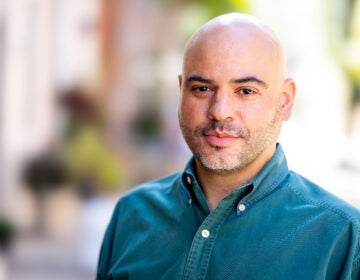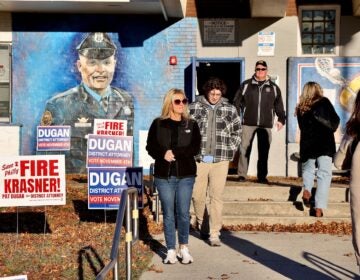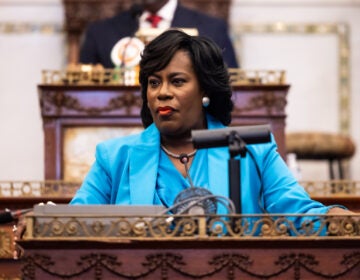Philadelphia’s biggest overtime earners triple their base salary through working extra hours
Philadelphia city employees working long hours due to understaffing earn massive overtime wages, with some earning more than the mayor.
Listen 6:08
The city spent more than $370 million on overtime in 2024, data shows. (iStock)
From Philly and the Pa. suburbs to South Jersey and Delaware, what would you like WHYY News to cover? Let us know!
In 2024, Philadelphia spent more than $330 million on overtime throughout the city’s various departments, according to data analyzed by WHYY News, with short staffing in the public safety sector largely to blame.
According to the data, nine city employees tripled their annual salaries through overtime last year. Another 520 doubled their earnings.
The city employee who increased their earnings the most through overtime is Navin Soni, a prisons corrections officer. According to the data, Soni earned $198,908 in overtime by working up to 16 hours a day, regularly working more than five days a week.
Add that to his base annual salary of $73,361 and Soni made slightly more last year, $272,269, than Mayor Cherelle Parker, who made $269,708.
Soni’s 16-hour shifts might seem long, but they’re part of a measure to make sure prisons are staffed, said Philadelphia Prisons Department Commissioner Michael Resnik.
Oftentimes after the standard 12-hour shift, an officer is asked to stay on for an additional 4 hours.
“Overtime is done here. Voluntarily or mandated,” he said.
Resnik is offering double the normal pay for overtime hours every week from Thursday to Sunday to keep in line with a court order to give inmates the proper recreation time. This is likely part of the reason Soni was able to earn nearly $200,000 in overtime.
The Prisons Department’s aggressive need for overtime stems from a lack of public safety officers, said City Controller Christy Brady. Since fiscal year 2019, the city’s prison department saw a “43% reduction in uniformed officers, while police saw a 20% reduction,” she said.
The lack of staff and dependency on overtime has led the Prisons Department to rack up a $32.7 million overtime bill in 2024.
Police lead the city in overtime costs
While Soni is the city’s top earner through overtime pay, the police department as a whole far outpaced other departments, spending roughly $150 million on overtime in 2024. Police Commissioner Kevin Bethel said the figure appears high, but he’s been reviewing it with his top aides.
“We don’t have a policy to hourly work limits,” Bethel said. “So, if you were working an outside job, then the most you could work would be 32 hours per week.”
Officers can earn “reimbursable overtime” by working an “outside job,” which is when businesses pay for the privilege of having a uniformed officer at their facility for security. That gives officers a chance at a “second job” paid for through the city but reimbursed by business owners.
Officer Raymond Sutton more than tripled his base salary through overtime pay, the data shows. In 2024, Sutton made about $183,600 in overtime pay on top of his annual $90,253 salary, bringing his yearly earnings up to $273,853, or about $4,000 more than the mayor made last year.
Sutton isn’t the only officer who made significant earnings on top of their base salary.
Three other officers and a corporal from the department also made at least $175,000 in overtime pay alone, all of whom had base salaries less than $100,000 a year..
Bethel added there are some situations where limiting overtime is not possible for police — like the Eagles’ Super Bowl celebrations, protests or presidential debates. Officers on what’s called rostered days off, or RDOs, can be called in under such circumstances.
“All that requires bringing a significant amount of staffing into the department,” Bethel said. “And on those days, an officer that you say is on that cycle, I’m canceling those days RDOs and everyone’s working.”
Bethel admits reform is needed and says he’s working to make it happen.
“We have some work to do, obviously,” he said.
Any reforms in how city police manage overtime hours would take cooperation from the Fraternal Order of Police Lodge 5, the union that represents Philadelphia officers.
“I will speak to the commissioner about anything that he thinks will help the members,” said union President Roosevelt Poplar. “They’re getting burned out when they’re being forced to work overtime because they don’t have enough manpower to cover the streets and some of these details out there. It’s not just they’re volunteering overtime and the budget is going for that. It’s the fact that they have to acknowledge that they do not have enough police officers in the city to cover what needs to be covered.”
Special events send fire department overtime soaring
Employees with the Philadelphia Fire Department earned more than $80 million in overtime pay in 2024. And again, three department employees surpassed $180,000 in overtime.
Fire Capt. Sean Needham, whose base salary was $117,290 in 2024, made more than $300,000 in total compensation because of $183,566.51 in overtime pay he accrued last year.
Fire department leaders would not agree to an interview, but said in a statement that the department provides fire protection and emergency medical services to citizens and visitors every hour of every day. When their members are sick or on vacation, they need to backfill with overtime. Overtime is also used for special events that happen on a consistent basis in Philadelphia.
The statement said that authorizing “capable and certified members to work additional hours allows them to continue to provide that dedicated service, no matter what.”
‘People aren’t machines’
Consistently working very long hours can take a toll on employees, experts say. That can especially be a concern for workers in high-stakes positions like police and correction officers, firefighters and paramedics.
“If you’re working that many hours, first of all, there’s no way that you’re getting eight hours a night, probably not getting seven,” said Olivia Walch, the CEO of Arascope, which helps people fix their sleep rhythms. “People aren’t machines; you can’t get off work and immediately turn off and start sleeping.”
This lack of sleep can manifest in several problems, said Walch, who also works as a researcher in the University of Michigan Department of Neurology.
“One of the things that gets impaired is their ability to know that they’re bad at what they’re doing,” she said.
Short naps can provide a temporary boost to performance, she said, but those don’t negate the long-term effects that sleep deprivation can have.
A lack of sleep can have a number of detrimental effects, including having a worse mood at work and being more likely to get sick. Walch added that sleep deprivation is also “an element of a lot of chronic diseases that really get you later in life.”
Fatigue is a concern
These problems aren’t lost on city officials.
Bethel said he is concerned about “officer wellness, their fatigue on the job and those things are critical to make sure that we have officers out there fully engaged and able to do the work effectively.”
Councilmember Jim Harrity, a former city streets department worker, said he was concerned about the overtime spent and approved after being presented the numbers.
“Why is it that they feel the need that one person has to work this many hours?” Harrity said. “I just don’t see how the fatigue doesn’t set in.”
The amount of time spent working wasn’t lost on Harrity either.
“The mental stress of actually being out on that many calls ‘cause these are medics. These are police officers. These are corrections officers,” he said. “They’re all very high stress, dangerous jobs that I believe sleep deprivation would have some consequences.”
Harrity said his staff will look over the numbers, and he may call for hearings on the issue when council resumes next month.
Editor’s Note: Nate Harrington’s WHYY News internship has been made possible thanks to the generous support of the Dow Jones News Fund O’Toole Family Foundation Internship.
 This story is a part of Every Voice, Every Vote, a collaborative project managed by The Lenfest Institute for Journalism. The William Penn Foundation provides lead support for Every Voice, Every Vote in 2024 and 2025 with additional funding from The Lenfest Institute for Journalism, Comcast NBC Universal, The John S. and James L. Knight Foundation, Henry L. Kimelman Family Foundation, Judy and Peter Leone, Arctos Foundation, Wyncote Foundation, 25th Century Foundation, and Dolfinger-McMahon Foundation.
This story is a part of Every Voice, Every Vote, a collaborative project managed by The Lenfest Institute for Journalism. The William Penn Foundation provides lead support for Every Voice, Every Vote in 2024 and 2025 with additional funding from The Lenfest Institute for Journalism, Comcast NBC Universal, The John S. and James L. Knight Foundation, Henry L. Kimelman Family Foundation, Judy and Peter Leone, Arctos Foundation, Wyncote Foundation, 25th Century Foundation, and Dolfinger-McMahon Foundation.
To learn more about the project and view a full list of supporters, visit www.everyvoice-everyvote.org. Editorial content is created independently of the project’s donors.

Get daily updates from WHYY News!
WHYY is your source for fact-based, in-depth journalism and information. As a nonprofit organization, we rely on financial support from readers like you. Please give today.







